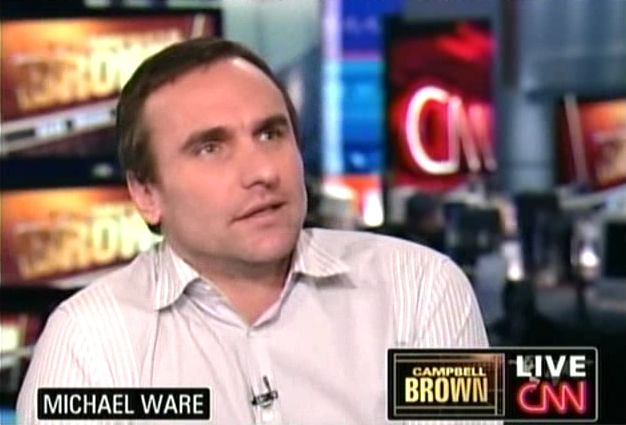CB: "...there's a huge difference between a holy war and a drug war."

Length: 3:20
LARGE (46.1 MB) ----- SMALL (4.1 MB)
Michael is still in New York and in the studio with Campbell Brown. She asks about the comparisons being made between the wars in Iraq/Afghanistan and the cartel war.
(At the end of the clip, as Campbell is describing what will be on AC360, you can hear Michael talking to the crew. Oh, those live mics...)
CAMPBELL BROWN: Michael Ware with me now in the studio.
And, Michael, there's a new report out that's calling Mexico the next Iraq or Afghanistan. The comparisons --
MICHAEL WARE: Yeah, they don't really apply. A lot of people ask me about this, and I don't think that they're easy comparisons to make.
From the very nature of these conflicts, for example, there's a huge difference between a holy war and a drug war. There's also a huge difference in the way they're being fought. I mean, this is a criminal conflict that America is deeply involved with and ultimately is responsible for. So --
BROWN: But I think what they are referencing in part is some of the tactics...
WARE: Right.
BROWN: ... that you saw used on the ground in Iraq and Afghanistan are being employed.
WARE: Right. As I was about to say, is that when -- in Juarez, all right, this border city, I mean, this is said to be the most dangerous city in Mexico, 1,600 people were whacked there last year. They're well on their way to 2,000 already this year. And no Americans go there anymore.
The tourists have stopped. Even the GIs based on the other side of the border are banned from entering Juarez where they used to go and party.
BROWN: Right.
WARE: Now, although it's a totally different kind of conflict, I couldn't shake the feeling of familiarity. It's like... I know an insurgency when I see it. And in so many ways, these cartels can operate in the ways that, say, the militias operate in Iraq.
BROWN: Right.
WARE: They own the streets. They're the ones who are able to maintain power bases through intimidation and fear. And they're so well organized and they're so well armed, it's just that they're driven by an entirely different agenda, which is enormous profit, rather than religious zeal.
BROWN: And are you seeing or beginning to see, given, you know, the intensity with which the Mexican army's trying to deal with this, authorities there and the help they're starting to get from the U.S., signs of hope?
WARE: No. No, I'm not. Not yet.
BROWN: Long way from this?
WARE: Oh, yes, a long, long way from this. I mean, let me put it this way. As it exists right now, this so-called war isn't going to be won. Okay? There's not enough resources on either side of the border that's being applied to it.
We're not striking at the true cause of this war, which is America's demand for illicit drugs.
BROWN: Demand, right? Obviously.
WARE: Legalize all these drugs, regulate them, and most of this disappears. Now, that may not be palatable to a conservative American, you know, constituency.
Okay, your other alternative is, well, let's fight this war. Now, Calderon is trying to do that, the Mexican president, but his local police are corrupted. The federal police he can't count on. All he's got is the military. You essentially need a Baghdad-style surge in just Juarez alone, and I don't think we're going to see that.
BROWN: A story we're going to be covering a lot more certainly. Michael Ware for us tonight. Michael, thanks so much. Appreciate it.
WARE: Thanks, Campbell.
BROWN: And as we mentioned before, Anderson Cooper is down there. We're going to have much more from Anderson on "AC 360" tonight. We've also got an interview with Secretary of State Hillary Clinton. Be sure and watch "AC 360"'s special report, "The War Next Door," live from the U.S./Mexican border, that's tonight, tomorrow night, 10:00 p.m. Eastern.
